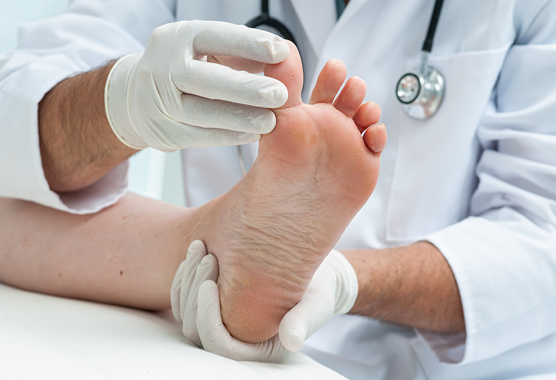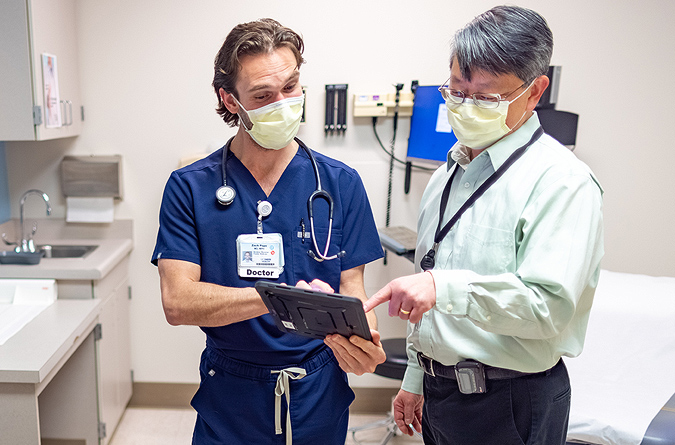Skin and Soft Tissue Infections
Certain bacteria can cause skin and soft tissue infections and may even spread throughout your body. Our infectious disease team offers the latest treatments for skin and soft tissue infections, including cellulitis, abscesses and MRSA.
Medically reviewed by Daniel Dodson, M.D. on Nov. 06, 2023.

The Latest Treatments for Skin and Soft Tissue Infections
Experts at the UC Davis Health Division of Infectious Diseases offer a full range of treatments for common to complex skin and soft tissue infections. We’re nationally recognized for infectious disease prevention and care.
Our Difference
Nationally Recognized Care
Our adult and pediatric infectious disease specialists have national recognition for their expertise in treating all types of infectious diseases.
Dedicated Clinic
Experts at our Infectious Diseases Clinic diagnose and treat less serious skin and soft tissue infections. We also have an outpatient infusion center for patients with infections who need IV antibiotics.
Innovative Research
Our team’s active participation in infectious disease clinical research is advancing the prevention and care of skin and soft tissue infections.
What Are Skin and Soft Tissue Infections?
Skin and soft tissue infections happen when bacteria break through and cause infections underneath your skin. Infections may become severe and involve deeper tissue, such as your muscles, nerves, fat and blood vessels.
Different skin and soft tissue infections have distinct causes and symptoms. In most cases, your provider will recommend antibiotics as the main treatment, but some also need removal of infected material.
Common Skin and Soft Tissue Infections:
Cellulitis
Group A Streptococcus (group A strep) and Staphylococcus aureus (staph) cause most cases of cellulitis. These bacteria enter your skin through an opening, causing infections in deeper skin layers. Your skin may get red, swollen and feel painful. You may also have blisters, fever, and chills which may require more aggressive therapy. Antibiotics treat cellulitis.
Folliculitis
This common bacterial infection starts in your hair follicles. The itchy, sometimes painful rash can appear anywhere you have hair. Staphylococcus aureus (staph) is the most common cause. The folliculitis rash often improves with at-home treatments like warm compresses. Some people need antibiotics.
Necrotizing Fasciitis
This rare but severe bacterial infection occurs when aggressive bacteria get into deep tissue layers through a wound or other skin opening. The bacteria then rapidly spread and destroy tissue which surrounds blood vessels, muscles, nerves and fat. Most people need antibiotics and surgery to remove the dead tissue. Necrotizing fasciitis is sometimes referred to as “flesh-eating disease”. Necrotizing fasciitis requires emergency medical attention and can be fatal.
Skin Abscesses
These are most commonly caused by Staphylococcus aureus (staph) which can cause pockets filled with pus to form below your skin’s surface. This may lead to swollen, red bumps that are often painful. Skin abscesses include boils (furuncles) and clusters of boils called carbuncles. Most abscesses improve over time. Your doctor may drain the pus and prescribe antibiotics for a large abscess.
Staphylococcus Infections and MRSA
Staphylococcus aureus (staph) are bacteria that may naturally live in your nose and on your skin. Sometimes the bacteria can enter deeper into your body, causing a staph infection. MRSA (Methicillin-resistant Staphylococcus aureus) is a staph infection that doesn’t respond to Methicillin and other commonly used antibiotics. Staph infections are usually on the skin, but can sometimes affect your blood, bones, lungs, heart and other parts of your body.
Causes and Risk Factors of Skin and Soft Tissue Infections
Bacteria cause skin and soft tissue infections. Your skin acts as a barrier, keeping harmful bacteria out.
However, bacteria can enter your skin through hair follicles, punctures, wounds or burns. This can lead to an infection in your skin and soft tissues.
Certain risk factors may make you more likely to get and become seriously ill from skin and soft tissue infections.
Top risk factors include:
Age
Older people, especially those who spend a lot of time in bed or move less, are more likely to get bedsores. These wounds can allow bacteria into the skin.
Chronic Swelling
Chronic swelling (edema) in your upper or lower limbs can stretch your skin, causing tiny tears that bacteria can move into.
Skin Conditions
People with eczema, athlete’s foot or diabetes-related skin problems are more at risk for skin infections. Rash-inducing viral infections like chickenpox also increase your risk.
Skin Wounds
Breaks in the skin – from wounds, needles, surgery and even bug bites – can allow bacteria to enter the skin.
Excess Weight
Being overweight or obese puts you at risk. Friction from skin folds, sweating and stretched skin can tear the skin.
Weakened Immune System
A weak immune system has a harder time fighting off infection-causing bacteria. Autoimmune diseases, cancer treatments or other conditions can weaken your immune system.
Why Treatment for Infections Matters
Infectious diseases are a public health challenge because they spread quickly. Young children, older adults and people with weakened immune systems are at risk of serious complications. Preventing the spread of infection is important for protecting your health and the health of others.

Request an Appointment
As Sacramento's No. 1 hospital, you'll benefit from unique advantages in primary care and specialty care. This includes prevention, diagnosis and treatment options from experts in 150 specialties.
Referring Physicians
To refer a patient, submit an electronic referral form or call.
800-4-UCDAVIS
Patients
Call to make an appointment.
Consumer Resource Center
800-2-UCDAVIS

Ranked among the nation’s best hospitals
A U.S. News & World Report best hospital in cardiology, heart & vascular surgery, diabetes & endocrinology, ENT, geriatrics, neurology & neurosurgery, and pulmonology & lung surgery.

Ranked among the nation’s best children’s hospitals
U.S. News & World Report ranked UC Davis Children’s Hospital among the best in pediatric nephrology, orthopedics*, and pulmonology & lung surgery. (*Together with Shriners Children’s Northern California)

Ranked Sacramento’s #1 hospital
Ranked Sacramento’s #1 hospital by U.S. News, and high-performing in aortic valve surgery, back surgery (spinal fusion), COPD, colon cancer surgery, diabetes, gynecological cancer surgery, heart arrhythmia, heart failure, kidney failure, leukemia, lymphoma & myeloma, lung cancer surgery, pacemaker implantation, pneumonia, prostate cancer surgery, stroke, TAVR, cancer, orthopedics, gastroenterology & GI surgery, and urology.

The nation’s highest nursing honor
UC Davis Medical Center has received Magnet® recognition, the nation’s highest honor for nursing excellence.

World-class cancer care
One of ~59 U.S. cancer centers designated “comprehensive” by the National Cancer Institute.

A leader in health care equality
For the 13th consecutive year, UC Davis Medical Center has been recognized as an LGBTQ+ Healthcare Equality Leader by the educational arm of America’s largest civil rights organization.

